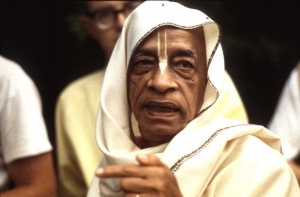SB 1.18.2

A.C. Bhaktivedanta Swami Prabhupada
TEXT 2
- brahma-kopotthitād yas tu
- takṣakāt prāṇa-viplavāt
- na sammumohorubhayād
- bhagavaty arpitāśayaḥ
SYNONYMS
brahma-kopa — fury of a brāhmaṇa; utthitāt — caused by; yaḥ — what was; tu — but; takṣakāt — by the snake-bird; prāṇa-viplavāt — from dissolution of life; na — never; sammumoha — was overwhelmed; uru-bhayāt — great fear; bhagavati — unto the Personality of Godhead; arpita — surrendered; āśayaḥ — consciousness.
TRANSLATION
Furthermore, Mahārāja Parīkṣit was always consciously surrendered to the Personality of Godhead, and therefore he was neither afraid nor overwhelmed by fear due to a snake-bird which was to bite him because of the fury of a brāhmaṇa boy.
PURPORT
A self-surrendered devotee of the Lord is called nārāyaṇa-parāyaṇa. Such a person is never afraid of any place or person, not even of death. For him nothing is as important as the Supreme Lord, and thus he gives equal importance to heaven and hell. He knows well that both heaven and hell are creations of the Lord, and similarly life and death are different conditions of existence created by the Lord. But in all conditions and in all circumstances, remembrance of Nārāyaṇa is essential. The nārāyaṇa-parāyaṇa practices this constantly. Mahārāja Parīkṣit was such a pure devotee. He was wrongfully cursed by an inexperienced son of a brāhmaṇa, who was under the influence of Kali, and Mahārāja Parīkṣit took this to be sent by Nārāyaṇa. He knew that Nārāyaṇa (Lord Kṛṣṇa) had saved him when he was burned in the womb of his mother, and if he were to be killed by a snake bite, it would also take place by the will of the Lord. The devotee never goes against the will of the Lord; anything sent by God is a blessing for the devotee. Therefore Mahārāja Parīkṣit was neither afraid of nor bewildered by such things. That is the sign of a pure devotee of the Lord.